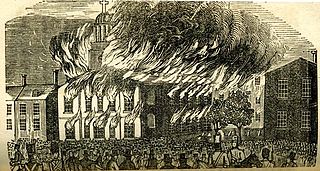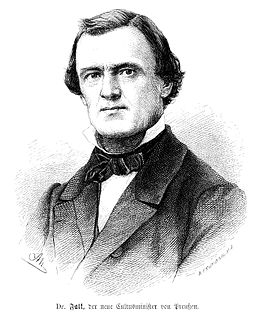The Congregations Law of 1875 is a legislative bill of the Kulturkampf period that abolished religious orders, stopped state subsidies to the Catholic Church, and removed religious protections from the Prussian constitution. It was based on similar legislation that had been voted in France a few years earlier.
Kulturkampf is a German term referring to the conflict between the German imperial government and the Roman Catholic Church from about 1872 to 1886, predominantly over the control of educational and ecclesiastical appointments. More rarely, the term is used by extension to refer to the power struggles between emerging constitutional democratic nation states and the Roman Catholic Church over the place and role of religion in modern polity, usually in connection with secularization campaigns.

France, officially the French Republic, is a country whose territory consists of metropolitan France in Western Europe and several overseas regions and territories. The metropolitan area of France extends from the Mediterranean Sea to the English Channel and the North Sea, and from the Rhine to the Atlantic Ocean. It is bordered by Belgium, Luxembourg and Germany to the northeast, Switzerland and Italy to the east, and Andorra and Spain to the south. The overseas territories include French Guiana in South America and several islands in the Atlantic, Pacific and Indian oceans. The country's 18 integral regions span a combined area of 643,801 square kilometres (248,573 sq mi) and a total population of 67.3 million. France, a sovereign state, is a unitary semi-presidential republic with its capital in Paris, the country's largest city and main cultural and commercial centre. Other major urban areas include Lyon, Marseille, Toulouse, Bordeaux, Lille and Nice.
Sixty-seven religious houses were dissolved within six months of the law's implementation and by June 1877, 189 had been suppressed. In the end, almost 3,000 religious men and women were directly affected by the Congregations Law, including the five drowned Franciscan nuns who were famously memorialized in Gerard Manley Hopkins’ “The Wreck of the Deutschland”.

Gerard Manley Hopkins was an English poet and Jesuit priest, whose posthumous fame established him among the leading Victorian poets. His manipulation of prosody established him as an innovative writer of verse. Two of his major themes were nature and religion.
However, were the law to have been implemented suddenly and completely, the Prussian government feared that up to 6,000 former nuns would be homeless and unable to find marriage or employment – a social problem even less desirable to the authoritarian state than the political influence of Catholicism.
As it happened, implementing the law in the diocese of Hildesheim in the Province of Hanover caused the closure of 36 schools run by religious congregations, requiring the state to provide education for 3,000 children. The costs were borne by the local community, a situation which was repeated around Prussia, making the laws broadly unpopular. Further, Catholic religious institutions did not comply independently with the new law, but had to be ordered individually, a process which slowed the implementation of the law significantly while raising the costs.

The Province of Hanover was a province of the Kingdom of Prussia and the Free State of Prussia from 1868 to 1946.
When a religious house was seized, more often than not all valuables had been hidden away, and sometimes it was found that the ownership of the property had been transferred into the name of a loyal Catholic layman, so that the law would not apply. Though it caused widespread hardship, the Congregations Law failed to advance the goals of the Kulturkampf.











